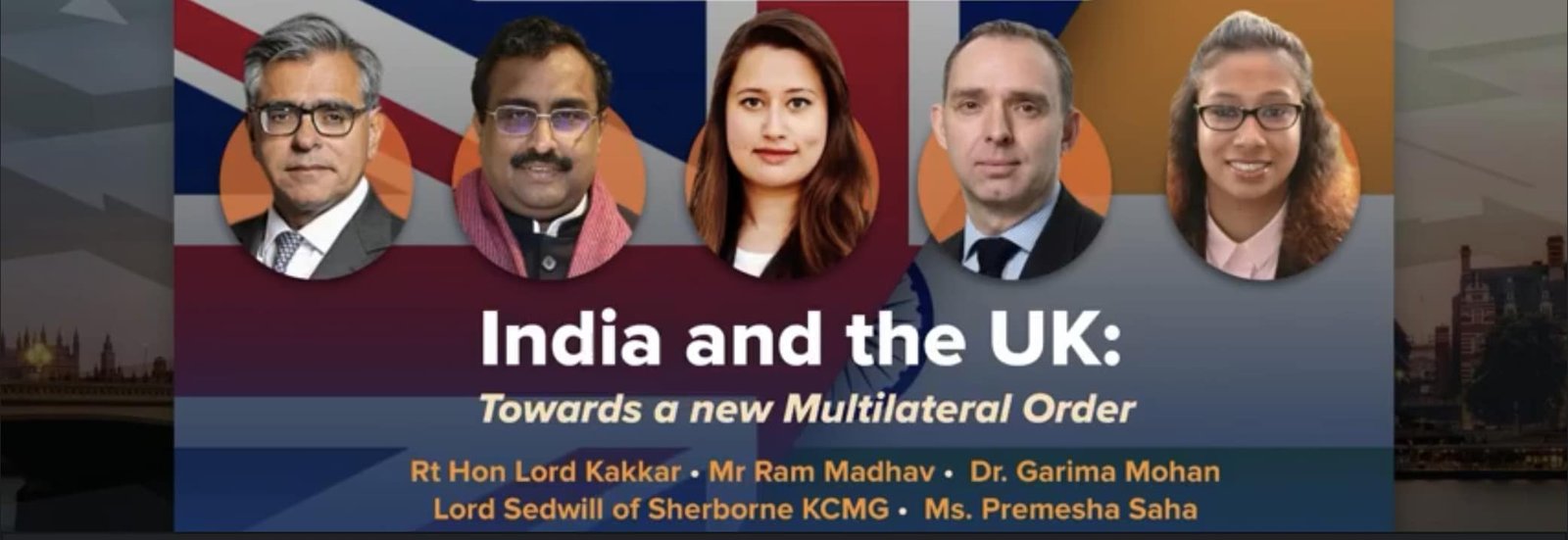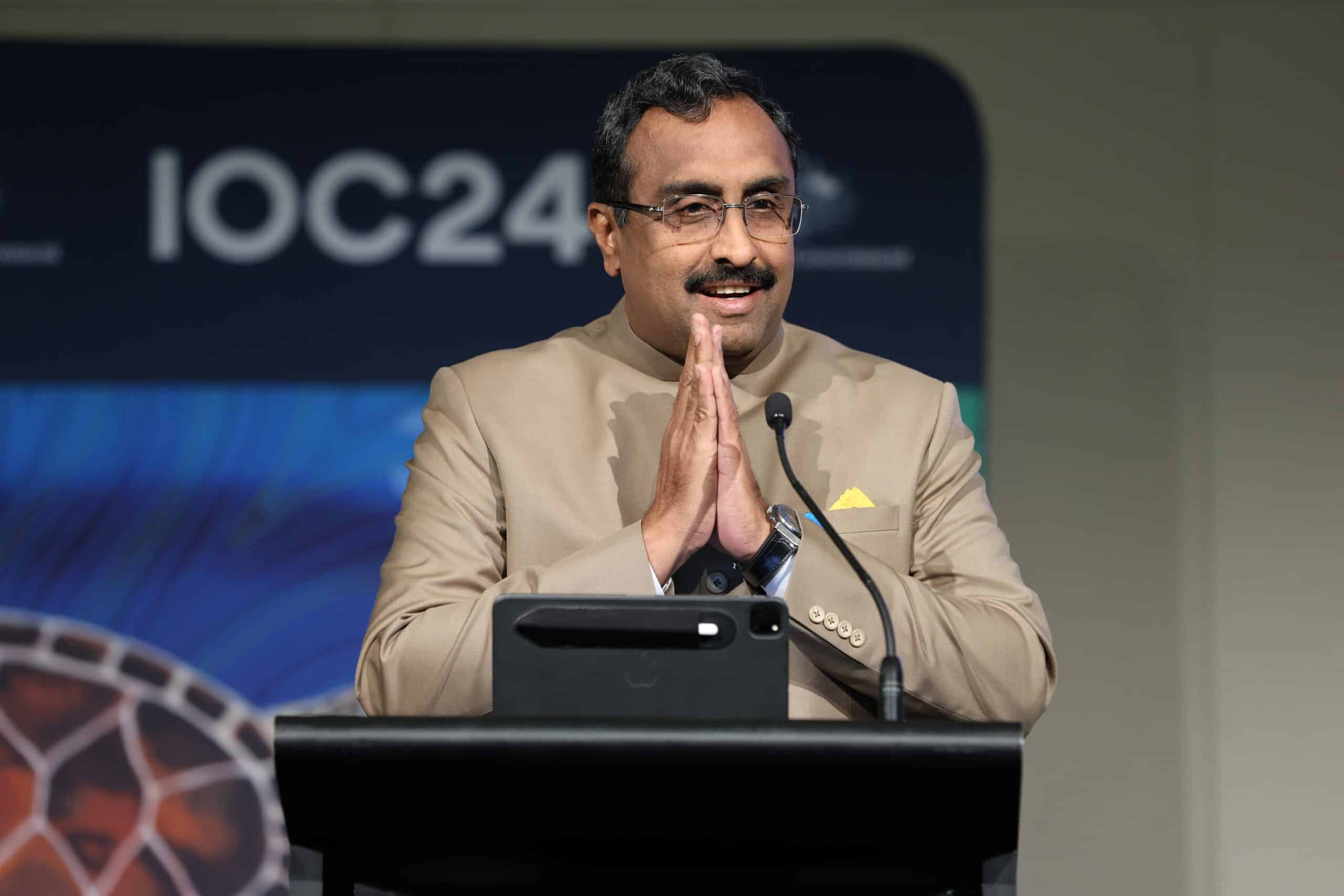
|
Getting your Trinity Audio player ready...
|
Text of Shri Ram Madhav’s Address at a Webinar organised by Policy Exchange and Observer Research Foundation on “India and the UK: Towards new Multilateral Order”
The mankind is entering a post-pandemic new world order. India and UK as ‘natural partners’ have an important opportunity in that emerging global order to prosper and progress through mutual cooperation. It is necessary for both the countries to cone out of the hangover of the past – from Commonwealth to Kohenoor – and build the partnership on a fresh agenda and vision. Both countries have charted ambitious paths for their future – India with its Atma Nirbhar agenda and UK with its Global Britain vision. There are four key areas – ECONOMY, CLIMATE RESILIENCE, INDO-PACIFIC and NEO-MULTILATERALISM – in which the two countries can build strong partnerships.
ECONOMY: India is on a path to aggressive economic progress and development. With a demographic dividend of 50% population below 25 years of age, and massive skilling, research, innovation and start-up initiatives India is aspiring to become a developed economy of $ 5 T by 2025 and double it by 2030.
Trade and economic cooperation between our two countries has a huge potential. India wants to develop into a manufacturing hub and brand maker. It is critical for India to the demographic potential and ever-growing workforce in the country. With improved taxation regime and ease-of-business indicators, India is eagerly looking for investments into many sectors including infrastructure, manufacturing, tourism, transport and services. London as an important financial hub of the world can be a major partner in India’s economic drive.
The enhanced Trade Partnership (ETP) agreed between the two nations is aimed at doubling the trade between India and UK by 2030. In 2019-20, the two-way trade stood at 15.4 billion USD.
CLIMATE RESILIENCE: In the new global order, ecological issues are going to take precedence over economic issues. India and UK – as two responsible global powers can together play a greater role in global climate resilience issues. COP 26 taking place at Glasgow later this year will be an excellent opportunity for the two countries join hands to take the leadership role in Paris Protocol and other climate issues.
At the recently concluded virtual summit between the Prime Ministers of India and UK, the two dignitaries have agreed to announce the green grid initiative at COP26 and promote climate resilient infrastructure through a new facility for SIDS under coalition for disaster resilient infrastructure and promote India-UK partnership on forests.
India has taken significant initiatives in clean energy development. Already the mining and usage of coal has been greatly restricted. An ambitious target of producing 450 GW renewable energy has been set for the year 2030. That will be India’s greatest contribution to securing the earth and humanity. UK can cooperate with India in terms of technology transfers and green financing in its initiatives.
INDIAN OCEAN & INDO-PACIFIC: One region where economy and ecology converge in the 21st Century is the Indian Ocean or Indo-Pacific region. Indian Ocean is India’s lifeline to progress and prosperity. UK has its traditional stakes in the region which it wants to revive. There is enormous scope for the two countries to work together on issues of the region from maritime economy and commerce to maritime ecology to maritime security.
The Indo-Pacific Oceans’ Initiative (IPOI) announced by the PM of India in 2019 is aimed at drawing partnership with like-minded countries to enhance bilateral and multilateral cooperation. The IPOI focuses on seven key pillars: trade connectivity, maritime transport, maritime security, maritime ecology, maritime resources, capacity building and resource sharing, disaster risk management, science, technology and academic partnership.
NEO-MULTILATERALISM: Last but most important is the cooperation at multilateral level for strengthening rules-based global order. The present mechanisms need to be replaced with newer ones. For example, G 7 can expand into D 10 of the democratic world. Besides Paris Protocol, India and UK can work together on issues like counterterrorism, cyber security etc. Data security issues too call for cooperation between our two countries.
The emerging global order will be split between techno-democracies and techno-authoritarianisms. Big Tech has also emerged as a new and powerful player. At a time when democracy deficit is on the rise and authoritarian regimes are trying to project themselves efficient flaunting their scientific-technological advancement, democracies have to come together with a new strategy to tackle the challenge. India and UK can take the lead in mobilising and strengthening global democratic ethos.



